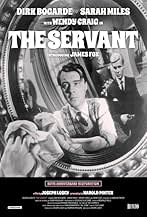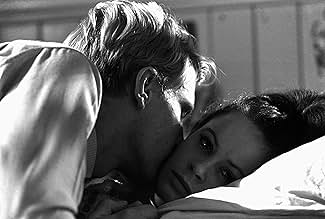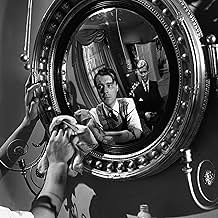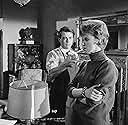PUNTUACIÓN EN IMDb
7,8/10
15 mil
TU PUNTUACIÓN
Tony, de gran fortuna, contrata a Hugo Barrett como criado, que resulta tener ciertos planes ocultos.Tony, de gran fortuna, contrata a Hugo Barrett como criado, que resulta tener ciertos planes ocultos.Tony, de gran fortuna, contrata a Hugo Barrett como criado, que resulta tener ciertos planes ocultos.
- Dirección
- Guión
- Reparto principal
- Ganó 3 premios BAFTA
- 8 premios y 11 nominaciones en total
Doris Nolan
- People in restaurant: Older Woman
- (as Doris Knox)
Reseñas destacadas
About midpoint Tony's girlfriend Susan asks servant Hugo, "What do you want from this house?" It's a direct and pointed question that's ambiguously answered ("I'm just the servant, mum.")
That ambiguity carries the dramatic tension along its murky but intriguing path, as a strange play of power and manipulation unfolds. Yet after a series of quirkly developments transpire and the tables of manservant and master are reversed, what's the real gain?
What was there in the house in the first place that was worth all the fuss and bother to acquire? Satisfaction of taking over the master role?
Whatever the goal, it all seems a tawdry victory. After the shoe's on the other foot and a few points are scored in this cheesy power game, where's the spoil?
What does drive this drama is Pinter's genius for inventing small talk that gives the illusion of grandeur Losey's direction is right on the mark, and the production design, score, photography--and the acting--are all top drawer.
As in his subversive play, "The Homecoming," Pinter manages to hold the attention with his unique pregnant pauses and hypnotic ambiance, which are actually illusionary. It could be a play about something very important or about nothing.
One thing is for certain: once "The Servant" is seen, one never quite forgets it.
This remains Dirk Bogarde's defining cinematic role.
That ambiguity carries the dramatic tension along its murky but intriguing path, as a strange play of power and manipulation unfolds. Yet after a series of quirkly developments transpire and the tables of manservant and master are reversed, what's the real gain?
What was there in the house in the first place that was worth all the fuss and bother to acquire? Satisfaction of taking over the master role?
Whatever the goal, it all seems a tawdry victory. After the shoe's on the other foot and a few points are scored in this cheesy power game, where's the spoil?
What does drive this drama is Pinter's genius for inventing small talk that gives the illusion of grandeur Losey's direction is right on the mark, and the production design, score, photography--and the acting--are all top drawer.
As in his subversive play, "The Homecoming," Pinter manages to hold the attention with his unique pregnant pauses and hypnotic ambiance, which are actually illusionary. It could be a play about something very important or about nothing.
One thing is for certain: once "The Servant" is seen, one never quite forgets it.
This remains Dirk Bogarde's defining cinematic role.
The song ' All Gone ' is played periodically through the duration of ' The Servant ' and it somehow sums the whole thing up. The period of the early sixties are long since gone, but the class divisions remain for better or worse ( mainly worse ) and in that sense the film is entirely relevant to today. I have seen this film only twice in my life, but giving myself a Joseph Losey ' season ' as they used to do, once upon the time, on the UK's BBC, but that too seems to be gone, reminds me of what we have lost in the cinema. Is it one of Losey's best films ? With certain reservations I think it is, and the merciless depiction of so-called ' order ' disintegrating into ' disorder ' sticks to the mind like glue. Except for a few exterior shots of Chelsea and a snow bound countryside the claustrophobia of the house in which the drama plays is palpable. You need air after watching this and to call it a drama is a bit of an overstatement. It is half way Harold Pinter and half way Samuel Beckett. Everything happens, and nothing happens, and the perennial Jean-Paul Sartre's ' Huis Clos ' and Harold Pinter's theatrical work in general, plus Samuel Beckett's ' Waiting for Godot ' come to mind. A closed universe without escape. Society's divisions of class and the trap of human life in itself are clearly visible. I am reluctant to give any spoilers except to say a manservant overwhelms the master of a house, and the temptations of losing control are too overwhelming for the master to resist. James Fox is excellent as the master, too passive to fight back and Dirk Bogarde gives arguably his best performance as a slightly camp manservant, and the obvious ( to me ) bisexuality between them also binds them together. Women are ' used ' in this scenario and to a certain extent Wendy Craig loses her righteous dignity and Sarah Miles as Bogarde's accomplice sinks further and further into self-degradation. It is perfect casting and Losey knew exactly what he was doing in choosing the actors. A party scene played as if it is in a mortuary appears dated, but looked at closely and listened to attentively it is entropy exemplified. A woman in black appears to hand out drugs to keep the master in a perpetual coma, and the other women in the room can barely move never mind indulge in any sexual acts. To sum up Losey sees a world collapsing into its inevitable oblivion. We the viewers watch, and despite having little background information about the characters we can draw own conclusions about what we are seeing, and like the people in the film gaze into mirrors as the only moorings to reflect our existence. A must see film but is its pessimism too hard to bear ?
This is a superb, sinister movie of the very highest class. Unlike the character Tony (James Fox) who is upper class without being high class, if you get my drift. You cannot really sympathise with Tony, who toys with some high falutin' development projects but basically is a wastrel just waiting to be ponced off. Tony is a later-day Bertie Wooster. The sinister element comes from the servant (Dirk Bogarde), who is no Jeeves. Barrett, like Jeeves , is a gentleman's gentleman or valet (not a butler as suggested in some other comments on this film). Tony needs a valet because he is incapable of doing anything much without help. Barrett and his accomplice Vera (Sarah Miles) take Tony to the cleaners, sweeping aside the fiancee Susan (Wendy Craig) in their wake.
Harold Pinter has written the screenplay in similar vein to the superb movie The Accident, also a Losey piece, which I also commend. The cinematography in both movies is simply excellent. The subject matter of The Servant suits Pinter, although much of the screenplay is not really in Pinter's voice. However, there is one scene, set in a restaurant, which includes a tiny cameo by Pinter himself and which contains a short Pinteresque exchange between two women. There is also one tense exchange between Susan and Barrett "do you wear deodorant" etc. which is very reminiscent of a scene in The Caretaker "you stink from arsehole to Thursday" etc. Indeed the story of The Servant resembles The Caretaker in many respects, except that in The Servant the interloper, Barrett, is on top and stays there, whereas in The Caretaker the interloper, Davies, lacks the skill and circumstances to dislodge the incumbent.
There is a homoerotic undercurrent to the film and this works so well because it is an undercurrent (in 1963 there could have been no more than an undercurrent even if they had wanted more). The overt debauchery with Vera and the orgy party towards the end of the film is the only bit of the film that has aged without grace. But I quibble.
This is a truly great film and it deserves to be more widely known.
Harold Pinter has written the screenplay in similar vein to the superb movie The Accident, also a Losey piece, which I also commend. The cinematography in both movies is simply excellent. The subject matter of The Servant suits Pinter, although much of the screenplay is not really in Pinter's voice. However, there is one scene, set in a restaurant, which includes a tiny cameo by Pinter himself and which contains a short Pinteresque exchange between two women. There is also one tense exchange between Susan and Barrett "do you wear deodorant" etc. which is very reminiscent of a scene in The Caretaker "you stink from arsehole to Thursday" etc. Indeed the story of The Servant resembles The Caretaker in many respects, except that in The Servant the interloper, Barrett, is on top and stays there, whereas in The Caretaker the interloper, Davies, lacks the skill and circumstances to dislodge the incumbent.
There is a homoerotic undercurrent to the film and this works so well because it is an undercurrent (in 1963 there could have been no more than an undercurrent even if they had wanted more). The overt debauchery with Vera and the orgy party towards the end of the film is the only bit of the film that has aged without grace. But I quibble.
This is a truly great film and it deserves to be more widely known.
The Servant is directed by Joseph Losey and adapted to screenplay by Harold Pinter from the novelette of the same name written by Robin Maugham. It stars Dirk Bogarde, Sarah Mles, Wendy Craig and James Fox. Music is by John Dankworth and cinematography by Douglas Slocombe.
When well-to-do Londoner Tony (Fox) hires Hugo Barrett (Bogarde) as his manservant, he gets more than he bargained for. Especially when Hugo's sister Vera (Miles) also arrives on the scene
The Servant remains as enigmatic today as it was back on its release in the early part of the 1960s. It's a film that defies classification, that rare old cinematic treat that continues to cause debate about not only its worth as art, but also its very meaning(s). A head bothering delight that revels in toying with your perceptions as much as Hugo Barrett enjoys toying with his supposed master. Lets play master and servant - indeed.
Set predominantly in the confines of Tony's swanky Chelsea abode, there's a disturbing claustrophobia that pervades the narrative, and this before we even begin to ponder the power of man, his ability to dominate and manipulate, or the reverse side that sees another's lack of ability to not succumb to the downward spiral instigated by a supposed lesser man.
Sprinkled over power issues are sexual desires, obtained, unfulfilled or simmering away unspoken. As the literate screenplay comes out in sharp dialogue snatches, breaking free of Pinter's other wise cement ensconced writing, there's evidence that this is a psychological study as opposed to the class system allegory that many thought it was way back then. This really isn't about role reversal, the finale tells us that.
Visually it's a box of atmospheric tricks as well. Losey and Slocombe use deep angular black and white photography to enforce the chilly dynamics at work in the story, the longer the film goes on, as it gets to the nitty gritty, the more jarring the camera work becomes – delightfully so – the house no longer an affluent person's residence, but a skew-whiff place of debauchery and mind transference. And mirrors - reflections, important and used to great effect.
Some scenes are striking and rich. Hugo at the top of the stairs standing in the bedroom doorway, in silhouette, an overhead shot of Hugo and Tony playing a childlike ball game on the stairs, a sex scene on a leather chair that we don't see but understand totally. And many more as Losey finds the material that allows him to show his skills.
Cast performances are across the board terrific, particularly Bogarde who gives a visual acting master class, and Fox who beautifully shifts a gear from toff twit into dependant dead beat. While Dankworth's musical accompaniments add flavour to the unfolding machinations. 9/10
When well-to-do Londoner Tony (Fox) hires Hugo Barrett (Bogarde) as his manservant, he gets more than he bargained for. Especially when Hugo's sister Vera (Miles) also arrives on the scene
The Servant remains as enigmatic today as it was back on its release in the early part of the 1960s. It's a film that defies classification, that rare old cinematic treat that continues to cause debate about not only its worth as art, but also its very meaning(s). A head bothering delight that revels in toying with your perceptions as much as Hugo Barrett enjoys toying with his supposed master. Lets play master and servant - indeed.
Set predominantly in the confines of Tony's swanky Chelsea abode, there's a disturbing claustrophobia that pervades the narrative, and this before we even begin to ponder the power of man, his ability to dominate and manipulate, or the reverse side that sees another's lack of ability to not succumb to the downward spiral instigated by a supposed lesser man.
Sprinkled over power issues are sexual desires, obtained, unfulfilled or simmering away unspoken. As the literate screenplay comes out in sharp dialogue snatches, breaking free of Pinter's other wise cement ensconced writing, there's evidence that this is a psychological study as opposed to the class system allegory that many thought it was way back then. This really isn't about role reversal, the finale tells us that.
Visually it's a box of atmospheric tricks as well. Losey and Slocombe use deep angular black and white photography to enforce the chilly dynamics at work in the story, the longer the film goes on, as it gets to the nitty gritty, the more jarring the camera work becomes – delightfully so – the house no longer an affluent person's residence, but a skew-whiff place of debauchery and mind transference. And mirrors - reflections, important and used to great effect.
Some scenes are striking and rich. Hugo at the top of the stairs standing in the bedroom doorway, in silhouette, an overhead shot of Hugo and Tony playing a childlike ball game on the stairs, a sex scene on a leather chair that we don't see but understand totally. And many more as Losey finds the material that allows him to show his skills.
Cast performances are across the board terrific, particularly Bogarde who gives a visual acting master class, and Fox who beautifully shifts a gear from toff twit into dependant dead beat. While Dankworth's musical accompaniments add flavour to the unfolding machinations. 9/10
Back in the late 1960's or early 70's I discovered this creepy psychological drama on local late-night TV. Once seen, it's never quite forgotten, and it's fascinating to see it once again beautifully restored and uncut in its new DVD release. Aspects of it stick with you years later, most especially the dark, moody torch song with some bizarre lyrics which is played repeatedly throughout the story on Mr. Tony's record player, seeming more sinister with each successive playing. By the time of its final hearing near the end of the movie, its effect is so oppressive that it's a relief when the record player is violently shoved off the table. One telling detail is in the scene where Mr. Tony is left alone after Barrett and Vera are expelled from the house, and his fiancee Susan also disappointedly leaves him. He dejectedly goes to an upstairs bedroom, and on the wall above the bed we see pictures of male body-builders.
The cast is uniformly excellent. This was apparently James Fox's film debut, as his credit indicates `Introducing James Fox.' He was obviously an experienced actor, though. In contrast, four years later he was affecting an American accent, singing and dancing, and amazingly, looking even younger in `Thoroughly Modern Millie.'
This is the sort of role that I always associate Dirk Bogarde with. The way Barrett's malevolent character is gradually revealed, not just through the script, but through Bogarde's facial expressions and body language, is a credit to this great actor's skill. This is one dangerous guy.
`The Servant' is a real gem of early 60's British film.
The cast is uniformly excellent. This was apparently James Fox's film debut, as his credit indicates `Introducing James Fox.' He was obviously an experienced actor, though. In contrast, four years later he was affecting an American accent, singing and dancing, and amazingly, looking even younger in `Thoroughly Modern Millie.'
This is the sort of role that I always associate Dirk Bogarde with. The way Barrett's malevolent character is gradually revealed, not just through the script, but through Bogarde's facial expressions and body language, is a credit to this great actor's skill. This is one dangerous guy.
`The Servant' is a real gem of early 60's British film.
¿Sabías que...?
- CuriosidadesWhen producer and director Joseph Losey was hospitalized with a brutal case of pneumonia for two weeks during this shoot, Dirk Bogarde continued filming assisted by minute, daily instructions over the phone from Losey's hospital bed. When Losey returned to the set, he did not re-shoot any of the script, much to the relief of cast and crew. Bogarde managed to keep the film on schedule, though he later said the experience made him determined never to direct.
- PifiasWhen Tony and Susan arrive at Tony's house in the Mercedes, with an extended visit in mind, they both go into the house and Tony leaves the car's lights on.
- Citas
Hugo Barrett: I'll tell you what I am. I'm a gentleman's gentleman, and you're no bloody GENTLEMAN!
- ConexionesFeatured in Stairs (1986)
Selecciones populares
Inicia sesión para calificar y añadir a tu lista para recibir recomendaciones personalizadas
- How long is The Servant?Con tecnología de Alexa
Detalles
Taquilla
- Recaudación en Estados Unidos y Canadá
- 45.522 US$
- Fin de semana de estreno en EE. UU. y Canadá
- 7859 US$
- 28 jul 2013
- Recaudación en todo el mundo
- 75.720 US$
- Duración1 hora 56 minutos
- Color
- Relación de aspecto
- 1.66 : 1
Contribuir a esta página
Sugerir un cambio o añadir el contenido que falta

Principal laguna de datos
By what name was El sirviente (1963) officially released in India in English?
Responde

































